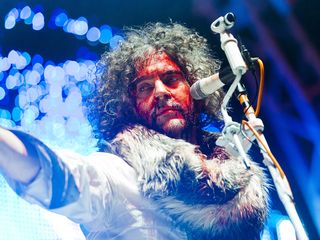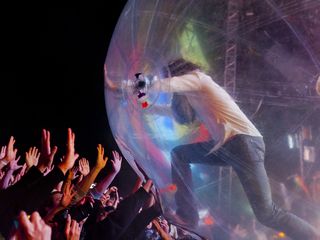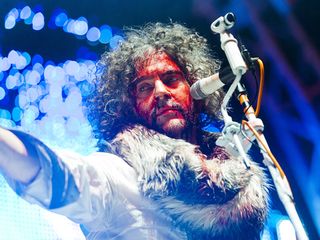
Want to spend a whole day with The Flaming Lips' Wayne Coyne? Now you can! © Paul R. Giunta/Corbis
"People have this idea that everything we do is far-out and weird," says Wayne Coyne, lead singer, guitarist and main man behind The Flaming Lips. "The truth is, our music is pretty crazy compared to what most bands do. To us, however, it's business as usual. Why would you listen to us to hear what you can get from everybody else? You wouldn't!"
Coyne has a point there, and he more than proves it on two of The Flaming Lips' recent releases. There's the 24-hour (yes!) song called 7 Skies H3, encased in human skulls and available as a very limited-edition item - only 13 copies are being issued on hard drives built into human skulls for the price of $5,000 each. (Take heart: the song is streaming live.)
Also out is I Found A Star On The Ground, a relatively brief six-hour ditty that folks can purchase with a toy called the Strobo Trip. But for those who still prefer their music in the minutes-not-hours format, Wayne and company have just recorded their take on The Beatles' classic Revolution, which will be presented on MTV's O Music Awards program.
MusicRadar caught up with Wayne Coyne the other day to discuss what all of this means.
A 24-hour song. Pretty conventional of you, eh, Wayne?
[laughs] "Yeah, right! It's pretty cool, isn't it? The great thing is, whether conventional or not, there should be no restrictions on where your ideas can go. If you want to do something that's different, you should be able to see it through. That doesn't always mean that what you do will be successful - or even interesting - but the important thing is to explore and see where an idea takes you.
"When we were doing the six-hour song, we said, 'OK, so now we'll do a 24-hour song.' At one point we thought about a song that could last for a whole month! [laughs] It's insane, but that's fine - a form of insanity is all right if it means not holding back on the art. A 24-hour song is pretty insane.
"Luckily, there are some restrictions. There's nothing right now that can carry something more than 24 hours. We talked to the people at iTunes about carrying a 24-hour song and they were like, 'No! You're insane. We can't do that.' I think the longest piece of music they have is 90 minutes."
In addition to encasing the music on a flash drive in the human skulls, it'll being streamed live.
"That's right. We'll be streaming it live ourselves starting Halloween at midnight. The stream will just go on and on. I think it'll go on for a year or so - whenever you want to hear some of it, you can. The only way we're selling the song is with the human skulls."
Which have already been sold.
"Yeah. They haven't been distributed yet, but they will be soon. And they're real skulls, too, from real people's heads. We would do more of them, but you just can't get a lot of real people's heads."
Go figure.
[laughs] "Go figure! Skulls are hard to come by. And it takes a while to get the hard drives into the heads once you get them."
There's 13 of them. Originally, it was only going to be five.
"You just never know how many heads will be available to you. As it turned out, we got more heads than we thought we would. It's a little bit of a weird thing, I guess, asking for somebody's head so I can put some music inside of it."

Coyne definitely thinks outside the bubble. © Paul R. Giunta/Corbis
Would you want somebody to put music in your head, er, skull?
"If I had the choice of having my skull buried in the dirt for worms and bugs to crawl around in or having somebody buy it and get some music in it, I'd go for the music. I'd be dead, so I wouldn't know the difference. Or maybe I would. Maybe I'd get a lot of joy from somebody buying my old head, my skull, and listening to music that was inside of it. If my bones can make somebody feel good, that's cool."
Twenty-four hours of music - how did you actually record it? Was it with loops, bits and pieces?
"We had some uncharted pieces of music, long pieces, that we played for hours and hours. They're slightly abstract. Actually, we did have a seven-hour piece that's very compelling."
You guys played for seven hours straight?
"No, we didn't do it for seven hours. We did play for a few hours, not really knowing where it was all headed. But that's what's so cool about this, the not knowing. We had all kinds of pieces - some went for seven hours, some went for four hours, some went for only 25 minutes.
"This stuff is hard to do. Playing music for three, four hours - that's hard work. Most musicians can't do what we do. We're a good group. Most bands go on stage and play a two-hour show of three and four-minute songs. We can play a whole piece of music for hours and hours and stay interested. It doesn't have to work or be good; it just has to be. The fact that we did it is reason enough to say, 'OK, well, there you go.'"
Do you actually expect people to listen to this song for 24 hours straight?
"No! [laughs] I mean, somebody might, and that's fine. I'd be happy to hear about that. But I think you should listen to it and do other things: have sex, take drugs, do your cleaning, eat dinner - whatever you want."
Would you ever think of putting on a 24-hour concert?
"It's interesting you ask, because we have talked about it. I think it would be for a very select audience. But, you know…yeah, I could see that. We could all go to a resort and be in a room together. Still, the musicians would have to take breaks - they'd have to go pee and eat and stuff like that."
You could do it like a telethon. While some of the band plays, you could take a nap. Then you'd return and somebody else would sleep.
"See…you saying that to me makes me think…'yes!' It sounds feasible to hear the way you just outlined it. We could do that. It could be trippy...painful and weird. By hour 21, I might be falling over. On the other hand, I might be like, 'Hey, we're almost done!' and I'd be jumping all around. Hour five might be really hard. OK, so nobody pay attention to hour five."
And for those wusses who can't take a 24-hour song, you do I Found A Star On The Ground.
"At six hours, right. It's another cool one. And how lucky am I to have Sean Lennon on it?"
Absolutely. How did that come about?
"When we were getting ready to do the song, I started thinking of various charities that we could work with, and it led me to think about John Lennon and what he said at the end of Strawberry Fields: 'cranberry sauce' - which, of course, everybody mistook for 'I bury Paul.'
"For the spoken-word part, I thought, How cool would it be to have Sean Lennon do it? He could sound like John Lennon - the whole thing would be absurd! I do know Sean, so it didn't feel weird or uncomfortable for me to call him and talk about the line at the end of Strawberry Fields. We just wanted to be playful with it.
"Sean enjoyed doing it. He sounds like this voice from beyond or something. What he's doing is announcing all of these names of people who donated to the two charities we put online. I think of it as he's reading off the people who have been abducted by aliens.
"And then there's this rather long nine-minute passage - well, it's a six-hour song, so you need long passages - where Sean says, 'We love you. We will always love you' over and over again. The piece of music turned out to be pretty powerful."
Speaking of things Lennon, you have the Lips' cover of Revolution. What new angle did you bring to the song?
"Well, we didn't change it. It's a difficult song to scream with the same kind of honestly that Mr. Lennon did back in 1968. When he sang the line 'If you go carrying pictures of Chairman Mao/ you ain't gonna make it with anyone anyhow,' it doesn't have the same impact or relevance now that it had back then. Hell, I don't think people even know who Chairman Mao was anymore.
"You can't change a Beatles song. Fucking around with something like Revolution, it's just not done. So what we do is, we sing it through a vocoder, which allows us to do a performance but not worry about interpreting the emotions behind every line. I don't feel comfortable trying to put myself in John Lennon's shoes in that way.
"Don't get me wrong: I love singing his songs that are about emotions and humanity and things like that. But he's also got some good, freaky, rocking songs, and Revolution is one of them. Singing it through a vocoder, I sound like an alien robot or something.
"And our version is just insane, too. We don't change it, we just do it like The Flaming Lips. When we cut it, I didn't even worry if my guitar was in tune. I just played a bunch of freak-out stuff. But it's got a lot of energy, so I think people will like it a lot."


